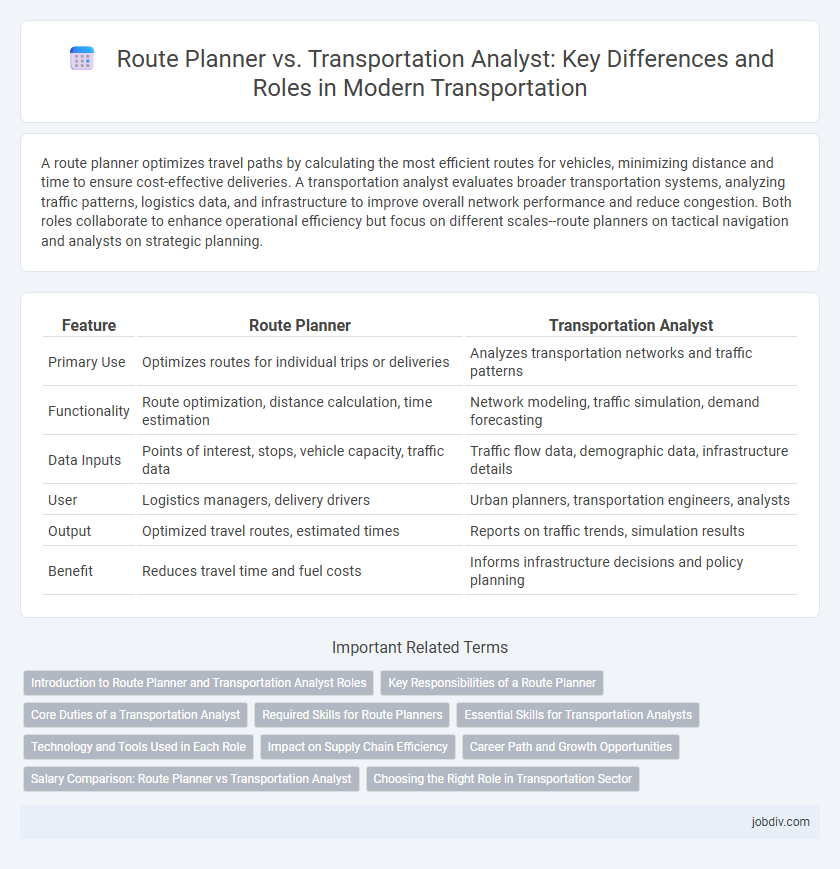A route planner optimizes travel paths by calculating the most efficient routes for vehicles, minimizing distance and time to ensure cost-effective deliveries. A transportation analyst evaluates broader transportation systems, analyzing traffic patterns, logistics data, and infrastructure to improve overall network performance and reduce congestion. Both roles collaborate to enhance operational efficiency but focus on different scales--route planners on tactical navigation and analysts on strategic planning.
Table of Comparison
| Feature | Route Planner | Transportation Analyst |
|---|---|---|
| Primary Use | Optimizes routes for individual trips or deliveries | Analyzes transportation networks and traffic patterns |
| Functionality | Route optimization, distance calculation, time estimation | Network modeling, traffic simulation, demand forecasting |
| Data Inputs | Points of interest, stops, vehicle capacity, traffic data | Traffic flow data, demographic data, infrastructure details |
| User | Logistics managers, delivery drivers | Urban planners, transportation engineers, analysts |
| Output | Optimized travel routes, estimated times | Reports on traffic trends, simulation results |
| Benefit | Reduces travel time and fuel costs | Informs infrastructure decisions and policy planning |
Introduction to Route Planner and Transportation Analyst Roles
Route Planners design efficient travel paths by analyzing distance, traffic patterns, and delivery constraints, optimizing routes for cost and time savings. Transportation Analysts evaluate transportation systems through data modeling and performance metrics, identifying improvements in logistics and infrastructure. Both roles utilize geospatial data and advanced software to enhance transportation efficiency and decision-making.
Key Responsibilities of a Route Planner
A Route Planner is responsible for designing efficient travel routes by analyzing traffic patterns, delivery schedules, and geographic constraints to minimize travel time and fuel consumption. They utilize GPS technology and mapping software to optimize routing for logistics companies, ensuring timely deliveries and cost-effective operations. Their key responsibilities include coordinating with drivers, updating route plans in real-time, and maintaining compliance with transportation regulations.
Core Duties of a Transportation Analyst
A Transportation Analyst primarily evaluates traffic patterns, optimizes transit routes, and analyzes transportation data to improve system efficiency. Their core duties include conducting cost-benefit analysis, forecasting demand, and developing policy recommendations to enhance urban mobility. Unlike a Route Planner who focuses on mapping specific routes, the Transportation Analyst uses data-driven insights to support strategic decision-making and infrastructure planning.
Required Skills for Route Planners
Route planners require strong spatial analysis skills, proficiency in GIS software, and an in-depth understanding of traffic patterns and logistics. Their expertise in optimizing routes involves data analysis, time management, and knowledge of transportation regulations. Unlike transportation analysts who focus on data interpretation and policy recommendations, route planners prioritize real-time problem-solving and practical route optimization.
Essential Skills for Transportation Analysts
Transportation analysts require strong data analysis skills, proficiency in geographic information systems (GIS), and expertise in traffic modeling to optimize transportation networks effectively. Unlike route planners who focus primarily on creating efficient travel paths, transportation analysts interpret complex datasets to forecast demand, assess infrastructure performance, and recommend strategic improvements. Mastery of statistical software and knowledge of urban planning principles are essential for transportation analysts to support sustainable and efficient transit solutions.
Technology and Tools Used in Each Role
Route Planners utilize GPS mapping software, geographic information systems (GIS), and route optimization algorithms to design efficient travel paths. Transportation Analysts rely on advanced data analytics platforms, simulation software, and traffic modeling tools to evaluate transportation systems and forecast demand. Both roles integrate real-time data and machine learning technologies to enhance decision-making and operational efficiency in transit planning.
Impact on Supply Chain Efficiency
Route planners enhance supply chain efficiency by optimizing delivery paths using real-time traffic data and geographic information systems, reducing transit times and fuel consumption. Transportation analysts evaluate transportation networks, analyze cost factors, and identify bottlenecks to improve overall logistics strategies and resource allocation. Together, these roles drive reduced operational costs, faster delivery cycles, and increased customer satisfaction in supply chain management.
Career Path and Growth Opportunities
A Route Planner specializes in optimizing travel routes to improve efficiency in logistics, using tools like GIS and traffic data, and typically advances into senior planning or logistics management roles. Transportation Analysts focus on data-driven decision-making, analyzing transportation systems and policies to recommend improvements, often progressing toward positions in urban planning, policy development, or consultancy. Careers in both fields offer growth opportunities in technology integration, sustainability initiatives, and leadership within transportation and supply chain industries.
Salary Comparison: Route Planner vs Transportation Analyst
Transportation analysts typically earn higher salaries than route planners due to their advanced analytical skills and strategic responsibilities. According to the Bureau of Labor Statistics, the median annual wage for transportation analysts is approximately $85,000, whereas route planners average around $55,000 per year. Salary variations depend on factors such as geographic location, experience level, and the complexity of transportation systems managed.
Choosing the Right Role in Transportation Sector
Selecting the right role in the transportation sector hinges on understanding the distinct functions of a Route Planner and a Transportation Analyst. Route Planners specialize in creating efficient travel paths to minimize time and energy, leveraging GPS data and traffic patterns. Transportation Analysts focus on interpreting data trends, optimizing logistics, and improving overall transportation systems using advanced analytical tools and software.
Route Planner vs Transportation Analyst Infographic

 jobdiv.com
jobdiv.com